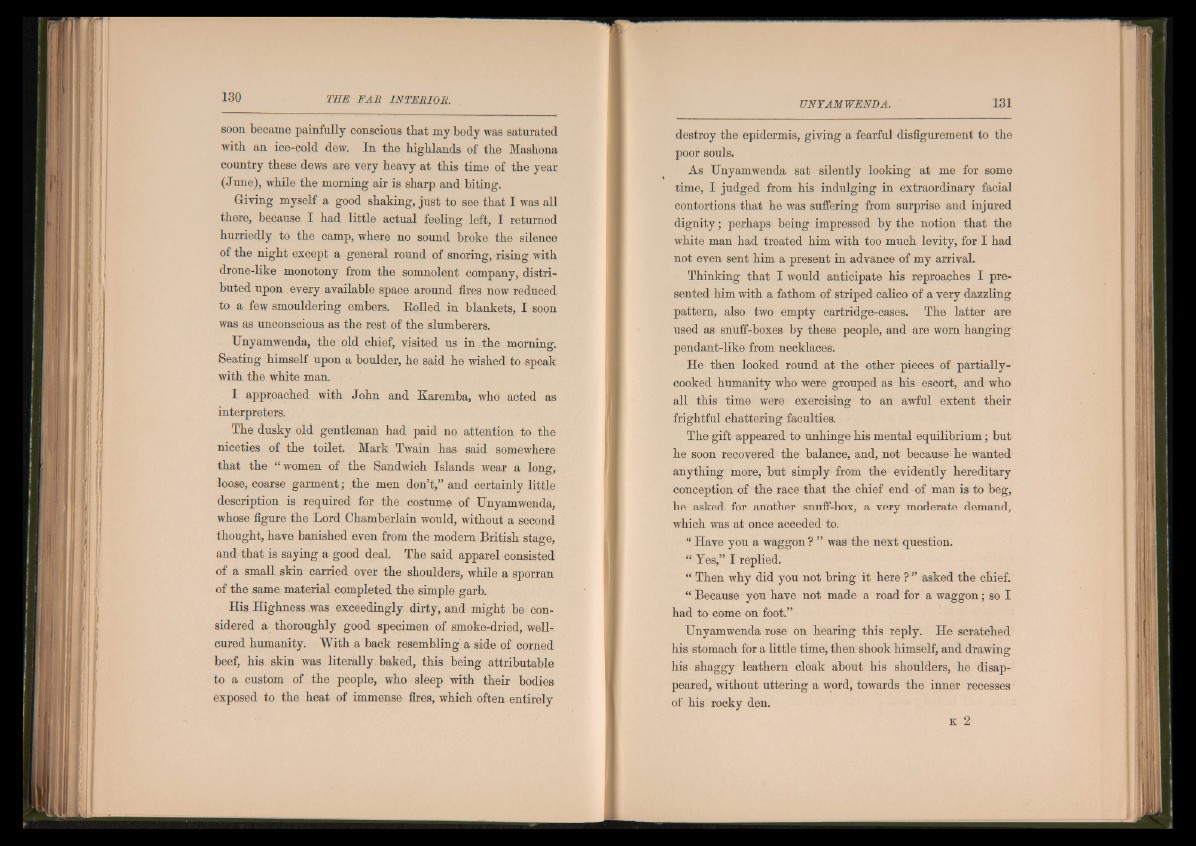
soon became painfully conscious that my body was saturated
with an ice-cold dew. In the highlands of the Mashona
country these dews are very heavy at this time of the year
(June), while the morning air is sharp and biting.
Giving myself a good shaking, just to see that I was all
there, because I had little actual feeling left, I returned
hurriedly to the camp, where no sound broke the silence
of the night except a general round of snoring, rising with
drone-like monotony from the somnolent company, distributed
upon every available space around fires now reduced
to a few smouldering embers. Rolled in blankets, I soon
was as unconscious as the rest of the slumberers.
Unyamwenda, the old chief, visited us in,the morning.
Seating himself upon a boulder, he said he wished to speak
with the white man.
I approached with John and Karemba, who acted as
interpreters.
The dusky old gentleman had paid no attention to the
niceties of the toilet. Mark Twain has said somewhere
that the “ women of the Sandwich Islands wear a long,
loose, coarse garment; the men don’t,” and certainly little
description is required for the costume of Unyamwenda,
whose figure the Lord Chamberlain would, without a second
thought, have banished even from the modern British stage,
and that is saying a good deal. The said apparel consisted
of a small, skin carried over the shoulders, while a sporran
of the same material completed the simple garb.
His Highness was exceedingly dirty, and might be considered
a thoroughly good specimen of smoke-dried, well-
cured humanity. With a back resembling a side of corned
beef, his skin was literally baked, this being attributable
to a custom of the people, who sleep with their bodies
exposed to the heat of immense fires, which often entirely
destroy the epidermis, giving a fearful disfigurement to the
poor souls.
As Unyamwenda sat silently looking at me for some
time, I judged from his indulging in extraordinary facial
contortions that he was suffering from surprise and injured
dignity; perhaps being impressed by the notion that the
white man had treated him with too much levity, for I had
not even sent him a present in advance of my arrival.
Thinking that I would anticipate his reproaches I presented
him with a fathom of striped calico of a very dazzling
pattern, also two empty cartridge-cases. The latter are
used as snuff-boxes by these people, and are worn hanging
pendant-like from necklaces.
He then looked round at the other pieces of partially-
cooked humanity who were grouped as his escort, and who
all this time were exercising to an awful extent their
frightful chattering faculties.
The gift appeared to unhinge his mental equilibrium; but
he soon recovered the balance, and, not because he wanted
anything more, but simply from the evidently hereditary
conception of the race that the chief end of man is to beg,
he asked for another snuff-box, a very moderate demand,
which was at once acceded to.
“ Have you a waggon ? ” was the next question.
“ Yes,” I replied.
r Then why did you not bring it here ? ” asked the chief.
“ Because you have not made a road for a waggon; so I
had to come on foot.”
Unyamwenda rose on hearing this reply. He scratched
his stomach for a little time, then shook himself, and drawing
his shaggy leathern cloak about his shoulders, he disappeared,
without uttering a word, towards the inner recesses
of his rocky den.